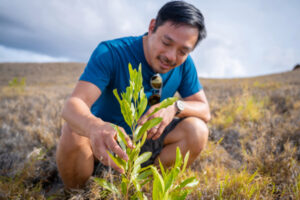Today, there are a large number of agritech companies in India looking to support farmers by providing them with the right information to grow high-yield crops. However, the challenge is reaching the farmers who hold small land parcels.
Parag Modi and Suresh Atluri founded Kisanwala in December 2020 to provide personalised and localised services to such farmers. The Hyderabad-based agritech startup aspires to be a platform and a marketplace where farmers can come and get help for all their needs across the crop lifecycle.
“An average Indian farmer holds about four acres of land and it becomes very difficult to provide personalised consultative services to the farmer in rural areas both due to lack of reach and non-digital models adopted by companies,” says Parag.
He says, the idea is to not make farmers go to the shop or run around to get agronomy/ financial/ mechanisation services, but the services should come to the farmer.
Today, Kisanwala claims to have about 50,000 farmers on the platform. Of that, more than 5,000 farmers have used one or more of its services.
The journey and what it offers
Parag says, during the pandemic, it became clear that farmers were facing a lot of challenges such as the availability of agri inputs, financial services, agronomy services, etc.
“We thought it was important to take action and do something that will change the experience of the farmers in dealing with the external world as well as help improve their income predictability and growth opportunity,” he adds.
The startup is now launching a brigital (brick and mortar + digital) social selling model called Market on Wheels (MOW) to provide doorstep service to farmers. The MoW will be managed by an agripreneur who will look at servicing farmers across 7-10 villages and will focus on providing services and insights to the farmer using the Kisanwala digital platform.
According to the founders, the MoW and the agripreneur will be equipped to provide end-to-end services to the farmer starting from agronomy services like soil testing, crop disease detection etc., sale of agri input, financial services, output services, and market syndication at their doorstep.
“We will be providing all our services using our various channels i.e., MoW, B2C, and B2B,” Parag says.
The team
Suresh and Parag have known each other for many years and had been discussing the concept of Kisanwala before demonetisation. Over the years, they invested time and resources to collect data and test out hypotheses using various channels, including doing surveys and farmer connects using MBA trainees. They finally decided to launch Kisanwala around Diwali in 2020.
Parag has more than 20 years of experience in the tech space, and has worked at Microsoft for over 10 years. His last role was as the director of product management and he has also worked in the blue collared space as the head of global development for G4S and CTO at TeamLease. Prior to Kisanwala, Parag founded another company in the blue collar space.
Suresh has 25+ years of experience in the agri space. He established Tierra Agrotech as a seed research company in 2012 and managed to take it public over a period of 10 years. Prior to this, he worked in senior positions in the sales and marketing space in the agri industry.
Today, Kisanwala has a team of about 20 people.
The USP
Parag says, “our social selling model is unique and is a first in the industry. We have a farmer-first model and would be looking at reaching out to the farmers using our various channels as well as providing a large number of digital solutions free to the farmers at their doorstep.”
Some of the other companies providing similar services are Agrostar, Bighaat, DeHaat, etc.
“The large players have old physical supply chain models and have limited understanding of their end customers. Based on our various conversations, we see that they are happy to partner with a digital company like Kisanwala to understand their customer as well as reach out to them personally,” says Parag.
The startup is now working with local dealers and distributors, enabling them to be sellers (trade partners) on its platform and sell their products and services.
Funding and revenue model
Last month, the startup raised around $1 million in an angel round led by veterans from the tech and agri industry.
“We are looking to close the financial year with about Rs 1 crore revenue, though the success of the year will be more in terms of testing our technology, setting up partnerships with large agri input companies, having an operations playbook in place, launching our initial MoW, and most importantly, setting up the core team, which will set us up to scale over the next few years,” says Suresh.
“Our various services will have different monetisation models. For input supply, we will look at providing genuine and right products to the farmers at a reasonable price, and also provide credit and insurance services, agronomy services, etc. We will be aspiring to provide most of our agronomy services free to the farmers, including soil testing,” he adds.
The startup’s business model, delivery model, and monetisation mechanism varies based on the services one uses on the platform. For agri input, the farmer will be paying for the seeds/crop protection and crop nutrition services. Base agronomy services will be free for the farmers. The startup has also partnered with both startups and large companies, says Suresh.
Kisanwala will also have advertising services both on the MoW and on its app, and agri input companies will pay for the same. On the output syndication side, the services will be free for the farmer and large agri output companies will pay.
Kisanwala’s intent is to change the way farmers receive the services and the economics and monetisation of these services, so that the farmer is benefited from the same, says Suresh.
The way ahead
According to Suresh, “88 percent of Indian farmers are small and marginal and fall under low-income groups. Rural economy is the backbone of India, which contributes to 30 percent of India’s GDP, which will be around $5 trillion by 2025. We felt that our theme gels well and addresses the needs of farmers, and has a huge impact on the overall rural.”
Speaking about expansion, Suresh says, “Over the next two years, we will be providing our services to farmers across at least 10 states.”
“Currently, we have 50,000 users across AP and Telangana. Kisanwala will be looking at onboarding a million farmers over the next two years and providing them with end-to-end services using its MoW, B2C, and B2B channels. The idea is to provide all platform and marketplace services to the farmers like agronomy services, agri input, financial services, and output services,” he adds.
For its flagship MoW channel, Kisanwala plans to grow to 30 MoWs by September 2022, test out the model, create a playbook through the Kharif season, and would like to get to 300 MoWs before the onset of 2023 Kharif.
In the next few years, the startup plans to create thousands of jobs in rural areas through its MoW initiative and dedicated agripreneurs.










